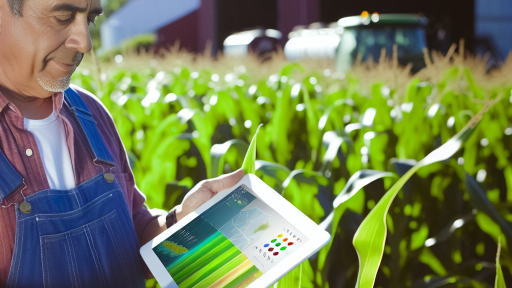Introduction to AI in Agribusiness
Artificial intelligence is transforming agribusiness supply chains.
This technology enhances efficiency and transparency throughout the supply chain.
Moreover, AI helps businesses respond to dynamic market demands effectively.
Understanding AI’s role is crucial for modern agricultural practices.
The Significance of AI
AI optimizes decision-making in farming and distribution processes.
It enables data analysis that improves yield prediction and resource management.
Additionally, AI can streamline logistics, reducing waste and costs.
Impact on Supply Chain Management
AI enhances supply chain management through predictive analytics.
This feature anticipates disruptions and helps mitigate risks.
Furthermore, it aids in inventory management for better resource allocation.
Collaborative Efforts for AI Integration
Farms and tech companies are collaborating to integrate AI solutions.
Such partnerships create tailored tools to address specific agricultural challenges.
Notably, these collaborations contribute to improved sustainability practices.
Understanding Supply Chains in Agribusiness
Key Components
Supply chains in agribusiness consist of several essential components.
First, raw materials are vital. They include seeds, fertilizers, and livestock.
Transform Your Agribusiness
Unlock your farm's potential with expert advice tailored to your needs. Get actionable steps that drive real results.
Get StartedNext, there are processing facilities. These transform raw products into finished goods.
Transportation also plays a crucial role. It ensures products reach markets efficiently.
Distribution centers store products before they go to retailers.
Lastly, retailers connect consumers to agribusiness products. They include grocery stores and farmers’ markets.
Challenges in Agribusiness Supply Chains
Agribusiness supply chains face numerous challenges.
Weather conditions can disrupt the supply of raw materials.
Further, fluctuating market demands create uncertainties.
Pests and diseases pose risks to crops and livestock.
Additionally, regulatory changes can affect sourcing and distribution.
Supply chain managers need to address these issues effectively.
The Role of Technology
Technology significantly impacts agribusiness supply chains.
Automation improves efficiency in processing and packaging.
Data analytics help forecast demand and manage inventories effectively.
Moreover, blockchain enhances traceability and transparency.
Finally, AI tools predict trends and optimize decision-making.
How AI is Transforming Supply Chain Management in Agriculture
Enhancing Forecast Accuracy
AI technologies improve the accuracy of supply chain forecasts.
They analyze historical data to predict future demand effectively.
Farmers and distributors can make informed decisions based on these predictions.
As a result, they reduce waste and optimize resource allocation.
Streamlining Logistics Operations
AI optimizes logistics routes, enhancing delivery efficiency.
Smart algorithms compute the fastest, most cost-effective pathways.
This leads to reduced transportation costs and minimized delays.
As a consequence, agribusinesses can respond promptly to market demands.
Improving Inventory Management
AI systems enable better inventory tracking in real-time.
Showcase Your Farming Business
Publish your professional farming services profile on our blog for a one-time fee of $200 and reach a dedicated audience of farmers and agribusiness owners.
Publish Your ProfileFarmers can monitor stock levels and avoid shortages.
Additionally, AI can forecast when to replenish supplies, ensuring continuity.
This proactive approach enhances operational efficiency across the supply chain.
Driving Sustainability in Agriculture
AI technologies contribute to sustainable practices within agribusiness.
They help farmers optimize inputs like water, fertilizers, and pesticides.
By using AI, farmers can significantly reduce their environmental impact.
This aligns with growing demands for sustainable agricultural practices.
Facilitating Data-Driven Decision Making
AI enables agribusiness leaders to harness data effectively.
They can analyze trends and patterns that influence supply chains.
Data-driven insights lead to better strategic decisions.
This capability fosters growth and profitability in the competitive agricultural sector.
Enhancing Traceability and Transparency
AI improves traceability throughout the supply chain.
It tracks products from farm to table, ensuring quality and safety.
This transparency builds consumer trust in agribusiness products.
Moreover, it helps address regulatory compliance effectively.
Uncover the Details: Benefits of Automated Systems in Farming Practices
Predictive Analytics: Forecasting Demand and Improving Inventory Management
The Power of Predictive Analytics
Predictive analytics leverages data to forecast future trends.
This approach allows agribusinesses to make informed decisions.
By analyzing historical data, companies can improve accuracy.
Consequently, businesses can anticipate changes in supply and demand.
This method reduces waste and optimizes resources effectively.
Enhancing Demand Forecasting
Utilizing machine learning algorithms enhances demand forecasting.
These algorithms identify patterns in data that humans might miss.
For instance, companies can track seasonal buying habits.
Additionally, they can monitor real-time market conditions.
This information helps businesses plan their production and inventory.
Improving Inventory Management
Smart inventory management is essential for success in agribusiness.
Using predictive analytics, companies can maintain optimal inventory levels.
This approach minimizes overstocking and stockouts simultaneously.
By analyzing inventory turnover rates, firms can streamline operations.
Moreover, businesses can employ just-in-time strategies to save costs.
Case Study: Green Leaf Farms
Green Leaf Farms implemented predictive analytics in their operations.
As a result, they significantly reduced waste in their supply chain.
They achieved a 30% decrease in excess inventory within six months.
Furthermore, their forecasting accuracy improved by 25%.
This success showcases the benefits of incorporating AI into inventory management.
Future Directions
The future of agribusiness relies on advanced technologies.
Pursuing AI-driven solutions will further enhance efficiency.
Businesses should continue investing in predictive analytics capabilities.
Looking ahead, integrating IoT with AI will yield even greater benefits.
Showcase Your Farming Business
Publish your professional farming services profile on our blog for a one-time fee of $200 and reach a dedicated audience of farmers and agribusiness owners.
Publish Your ProfileThis combination promises to revolutionize supply chain management.
Learn More: Comprehensive Guide to Farm Insurance Options
IoT and AI Integration: Real-time Data for Enhanced Decision Making
The Role of IoT in Agribusiness
Internet of Things (IoT) technology plays a crucial role in modern agribusiness.
It enables the collection of real-time data from various sources.
This data provides valuable insights for decision-making.
Farmers can monitor soil conditions, weather patterns, and crop health.
As a result, they can make more informed choices regarding planting and harvesting.
Enhancing Data Accuracy with AI
Artificial Intelligence (AI) enhances the data collected by IoT devices.
AI algorithms analyze large volumes of data rapidly.
This analysis identifies trends and anomalies that humans might miss.
Consequently, farmers receive more precise recommendations for their operations.
Moreover, predictive analytics can forecast outcomes based on historical data.
Streamlining Supply Chain Management
Integrating IoT and AI optimizes supply chain management in agribusiness.
IoT devices track products from farm to market in real-time.
This transparency minimizes delays and reduces waste.
AI optimizes logistics by predicting demand and adjusting supply accordingly.
As a result, businesses can improve efficiency and profitability.
Case Studies of Successful Implementation
Several companies have successfully integrated IoT and AI into their operations.
AgriTech Solutions developed a platform that combines IoT sensors and AI analytics.
This platform helps farmers optimize water usage and fertilizer application.
Similarly, Green Field Enterprises uses AI to forecast market trends.
Their insights help farmers make better planting decisions and maximize yields.
Future Trends in Agribusiness Technology
The future of agribusiness will likely see enhanced IoT and AI applications.
Advancements in machine learning will improve predictive accuracy.
Moreover, 5G technology will enable faster data transmission.
This speed will facilitate real-time decision-making in farming.
Additionally, automated drones may soon assist in monitoring crops and evaluating health.
Learn More: How to Create an Effective Farm Succession Plan

AI-Driven Logistics: Optimizing Transportation and Distribution
Enhancing Efficiency through Data Analysis
AI technology significantly enhances supply chain efficiency in agribusiness.
First, it analyzes vast amounts of data for smarter decision-making.
As a result, businesses can predict demand trends accurately.
Moreover, AI helps optimize routes for transportation.
This optimization reduces fuel costs and delivery times.
Improving Inventory Management
AI-driven systems monitor inventory levels in real-time.
Consequently, businesses avoid stockouts and overstock situations.
Furthermore, predictive analytics helps anticipate inventory needs.
This foresight leads to more efficient resource allocation.
Streamlining Transportation Operations
AI enhances the logistics of transporting agricultural products.
Smart algorithms assess transportation modes for efficacy.
They consider factors such as cost, speed, and reliability.
Showcase Your Farming Business
Publish your professional farming services profile on our blog for a one-time fee of $200 and reach a dedicated audience of farmers and agribusiness owners.
Publish Your ProfileIn turn, this improves overall service quality.
Real-time Tracking and Transparency
With AI, companies gain real-time visibility into their supply chains.
This transparency builds trust with customers and partners.
Additionally, real-time tracking allows proactive problem-solving.
Businesses can quickly address delays or obstacles.
Optimizing Delivery Routes
AI solutions are invaluable for route optimization.
They analyze traffic patterns and weather conditions effectively.
Consequently, delivery becomes faster and more reliable.
Reduced transportation times enhance customer satisfaction.
Case Studies of Successful Implementation
Various agribusinesses have successfully adopted AI for logistics.
For example, GreenFields Inc. saw a 25% reduction in costs.
They implemented route optimization strategies using AI.
Another case, FreshHarvest, improved delivery times by 30%.
This improvement stemmed from real-time inventory management solutions.
You Might Also Like: Protecting Your Farm Assets with the Right Insurance
Case Studies: Successful AI Implementations in Agribusiness Supply Chains
Improving Crop Yield Predictions
FarmTech Solutions utilized AI to enhance crop yield predictions.
They collected data from various sources, including weather forecasts and soil conditions.
Using machine learning algorithms, they refined their predictive models.
As a result, farmers received actionable insights specific to their fields.
This approach significantly increased crop yields and reduced waste.
Streamlining Distribution Logistics
AgriLogistics Inc. implemented AI to optimize their distribution routes.
The company analyzed patterns in customer orders and logistics data.
AI algorithms recommended the most efficient delivery routes.
This strategy reduced transportation costs and improved delivery times.
Consequently, customer satisfaction increased due to timely deliveries.
Enhancing Pest Management
GreenFields Agriculture adopted AI-driven pest management strategies.
They used image recognition technology to identify pest infestations.
Real-time alerts enabled farmers to respond promptly and effectively.
This proactive approach decreased pesticide usage significantly.
Moreover, it led to healthier crops and reduced environmental impact.
Reducing Supply Chain Disruptions
SmartFarm Technologies deployed AI to predict supply chain disruptions.
By analyzing historical data, they identified vulnerability patterns.
They created contingency plans to mitigate risks promptly.
This foresight minimized the impact of unforeseen events.
As a result, their supply chain proved more resilient and reliable.
Optimizing Resource Allocation
Harvest Innovations used AI to fine-tune resource allocation on farms.
They monitored soil moisture and nutrient levels using sensors.
This data informed precise irrigation and fertilizer applications.
Farmers were able to use resources more efficiently and sustainably.
Ultimately, this led to cost savings and improved crop health.
Showcase Your Farming Business
Publish your professional farming services profile on our blog for a one-time fee of $200 and reach a dedicated audience of farmers and agribusiness owners.
Publish Your ProfileFuture Trends: The Role of AI in Sustainable and Resilient Agribusiness Supply Chains
Integrating AI into Supply Chain Operations
AI is transforming supply chain operations in agribusiness.
Operators utilize predictive analytics for better decision-making.
This technology streamlines processes and reduces waste efficiently.
Moreover, AI can enhance forecasting accuracy, minimizing stock shortages.
Enhancing Sustainability with AI
AI contributes significantly to sustainable farming practices.
For instance, it can optimize resource allocation effectively.
Farmers can monitor soil health using AI-driven sensors.
This creates more sustainable agricultural outcomes overall.
Increasing Resilience in Supply Chains
AI enhances the resilience of agribusiness supply chains.
By predicting potential disruptions, businesses can prepare effectively.
Furthermore, AI algorithms assist in risk assessment and management.
This proactive approach allows for timely adjustments in operations.
Collaboration Between AI and Farmers
Farmers increasingly employ AI tools for operational insights.
This partnership leads to improved crop yields and better resource management.
Additionally, data from various sources feeds into AI systems.
Such data includes weather forecasts and market trends, enhancing overall efficiency.
Future Innovations on the Horizon
Upcoming innovations promise to reshape agribusiness supply chains.
For example, blockchain technology may combine with AI for traceability.
This integration can ensure food safety and quality compliance.
Ultimately, these technologies pave the road for smart agriculture.
Additional Resources
How AI Enables Resilience in Agri-Food Supply Chains | Cutter …
USDA Agri-Food Supply Chain Assessment: Program and Policy …




